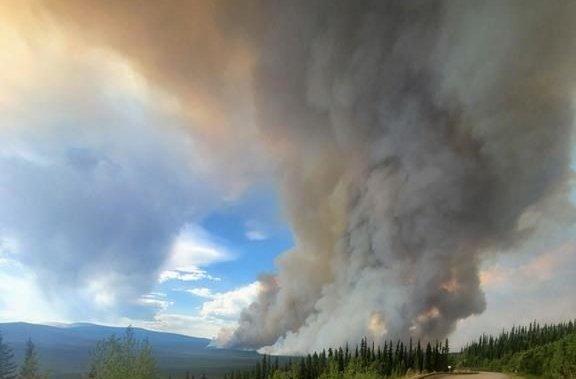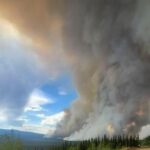In a sobering escalation of wildfire activity across Canada’s North, Yukon authorities have placed approximately 200 homes under evacuation alert as multiple wildfires threaten communities near Whitehorse. The rapidly evolving situation has prompted emergency response protocols and raised concerns about what could become another challenging fire season for the territory.
The evacuation alerts affect residents in Ibex Valley and Lake Laberge, communities situated northwest of Whitehorse, where lightning strikes ignited several wildfires late last week. These fires have expanded significantly due to unusually dry conditions and above-average temperatures that have persisted throughout the early summer months.
“We’re monitoring three fires of particular concern,” said Mike Smith, Yukon’s wildfire management coordinator. “The combination of low humidity, high temperatures, and unpredictable wind patterns has created challenging containment conditions. Our priority remains public safety while we deploy all available resources.”
Residents under evacuation alert have been instructed to prepare emergency kits, secure important documents, and remain vigilant for potential evacuation orders. Local emergency management teams have established temporary shelters at Whitehorse’s Canada Games Centre, where evacuees would be directed if full evacuation becomes necessary.
The largest of the fires, designated YU-WL042, has grown to approximately 1,200 hectares since Friday and is classified as “out of control” by territorial fire authorities. Aerial firefighting assets, including water bombers and helicopters equipped with buckets, have been deployed to combat the flames, supplemented by ground crews working to establish containment lines around populated areas.
“We’ve requested additional resources from neighboring jurisdictions,” confirmed Yukon Premier Ranj Pillai during a press conference yesterday. “While we’re not yet at the point of mandatory evacuations, we want residents to be prepared should conditions deteriorate further.”
Climate scientists have noted that Yukon’s fire season has begun earlier than usual this year, consistent with climate change predictions for northern regions. According to data from Canada’s Wildfire Information System, the territory has already recorded more than 40 active wildfires this season, significantly above the five-year average for this time of year.
The Yukon government has activated its Emergency Operations Centre to coordinate the multi-agency response, with representatives from wildfire management, emergency services, and municipal governments working collaboratively. Air quality advisories have been issued for communities within a 100-kilometer radius of the fires, with particularly poor conditions reported in Whitehorse, where residents have been advised to limit outdoor activities.
For residents with livestock or large animals, the Yukon Horse and Rider Association has organized emergency accommodation at facilities further from the fire zones. “We’ve received an outpouring of support from members willing to stable evacuated animals,” said Association President Emily Tredger. “The community always comes together during these challenging times.”
As climate change continues to alter fire patterns across Canada’s North, are we witnessing a fundamental shift in how northern communities must prepare for and respond to increasingly frequent and severe wildfire threats?
For continued updates on this developing situation, visit CO24 News or our dedicated Canada News section.























